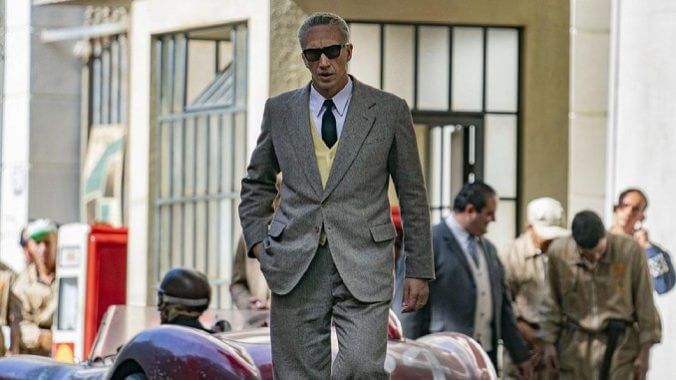Michael Mann’s Action-Packed Fascinations Veer Off-Road in Ferrari

Enzo Ferrari (Adam Driver) is “hearing voices in his sleep again,” he explains to his son (or rather his son’s emblazoned marble gravestone) at the beginning of Michael Mann’s Ferrari. The voices are unattached, floating in and out of Enzo’s life with disconcerting clarity. The specifics of this haunting are withheld, but perhaps they are confronting him with the same name that the audience is immediately bombarded with in those first 30 minutes: Jean Behra. Behra is one of the many polished, jauntily confident racers who circle Ferrari in hopes of piggybacking off of his success—tossing their lot and lives in with the Ferrari empire—lending Ferrari appropriate gravity as its namesake manages the ambitions and lives of his young racers.
Mann has dedicated his career to crafting stories about the soft, enduring relationships which give men relief from the rigors of masculinity. Like the Mann protagonists who precede him (Hawkeye in The Last of Mohicans or even Neil McCauley in Heat), Enzo’s life is made both liveable and complicated through long-standing working relationships with men. But the fulcrum of his life rests on his tempestuous wife, Laura (Penélope Cruz).
As Laura, Cruz embodies a fiery erraticism–like a permanently sharpened ax, ground to a razor’s edge, emitting sparks that instantly evaporate. Cruz and Driver are an odd pairing; one explosive and slick, the other elusive and cumbersome, but they relish the challenge of making this relationship feel real, spitting arguments at one another with vitriol steeped in regret. The Ferraris upend any tired notion of “behind every great man there’s a great woman.” Instead, Mann negotiates a harsher interpretation of such infamous marriages, where a great man’s life is built atop the exhausted remains of his heartbroken wife.
-

-

-

-

-

-

-

-

-

-

-

-

-

-

-

-

-

-

-

-

-

-

-

-

-

-

-

-

-

-

-

-

-

-

-

-

-

-

-

-








































